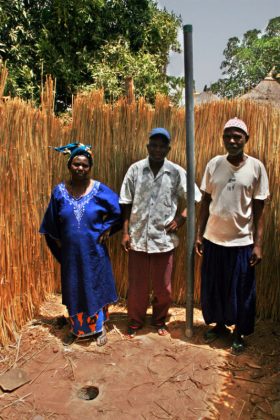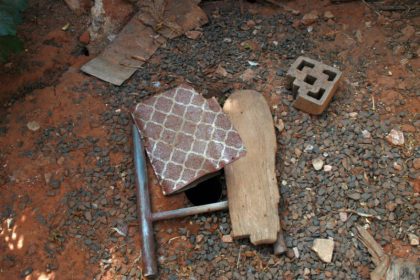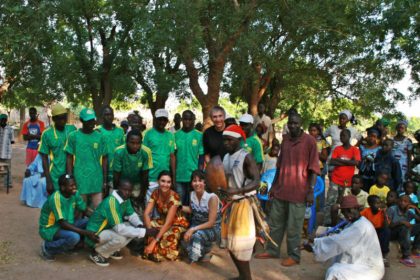 Location
Location
Sarre Fuuta, Village of Coumba Diouma, Department of Vélingara, Region of Kolda, Senegal
Community Description
Sarre Fuuta is a section of the small, rural, subsistence farming village of Coumba Diouma located about 15 km east of the town of Vélingara in the region of Kolda, Senegal. The village is located about 2 km off the national road, making it close to other communities but far enough off the dirt path that it is sometimes forgotten or left out by other organizations working in the area. In Sarre Fuute there are 10 families without electricity or running water. There are also no working latrines in this section of the village.
The region of Kolda, known as the peanut basin, is the poorest in Senegal. After the world price of peanuts plummeted in 2008, Coumba Diouma was directly affected. The families of Sarre Fuuta farm peanuts and corn. However, peanuts no longer bring in enough money to support families and the village has hit upon very hard times. Furthermore, this past rainy season there was too much rainfall and the harvest did not produce. They are relying primarily on the food donated by the World Food Program.
With a lack of nutrition and vitamins in their diet to stay healthy, illnesses spread easily. Sanitation is a major contributor to illness, particularly in Sarre Fuuta, where families live in close quarters and have no latrines to use. As a result, people are using the woods or patches of grass outside their compounds to go to the bathroom and diseases related to sanitation are prevalent and viciously contagious.
 The majority of children living in Coumba Diouma are from the families in Sarre Fuuta. All live in homes without latrines and soap and water are not used to wash hands after children drop their shorts and go to the bathroom in the middle of the family compound.
The majority of children living in Coumba Diouma are from the families in Sarre Fuuta. All live in homes without latrines and soap and water are not used to wash hands after children drop their shorts and go to the bathroom in the middle of the family compound.
Project Description
This project is to build 10 latrines in the Sarre Fuuta section of the village of Coumba Diouma.
The construction will be USAID-approved pit latrines, each with a 2 x 2-meter rebar-reinforced cement platform covering a 2-meter deep pit, 1 meter in diameter, with PVC piping to aid with ventilation and fly trapping to prevent this major carrier of the disease.
Each household will contribute a sum of 2,000 fCFA per latrine, the equivalent of 4 US dollars. Before the mason comes to build the latrine, a suitable site must be found, dug and prepped. Moreover, each participating family will contribute sand, water, and tools for the cement mixture.
Water Charity funds will help pay for the mason, and buy cement, rebar, PVC piping, and wire cutters for the rebar.
 Part of the community contribution will help pay for the mason as well as any other unforeseen expenses.
Part of the community contribution will help pay for the mason as well as any other unforeseen expenses.
President Alieu Diaw, as part of an in-kind contribution, will cover the transportation of the materials from Vélingara to Sarre Fuuta.
Finally, two health workers, Isotou Konté and Fatoumata Bâ will continue to provide the educational component of the project by going house to house as well as to the local primary school to talk about how to care for the latrine, how to wash hands properly after using the latrine, and the importance of always using the latrine.
Project Impact
All 325 people in the village of Coumba Diouma will directly benefit from this project.
Peace Corps Volunteer Directing Project
Rachael Honick
Comments
This project comes upon the successful completion by Rachael of the Coumba Diouma Latrine Project – Senegal, a similar project in the section of Coumba Diouma called the Campament.
The project will result in access to latrines for the entire of the village and increase understanding of the importance of using latrines and washing hands. This will lead to the reduction of sanitation-related diseases in the village.
Dollar Amount of Project
$555.00
Donations Collected to Date
$555.00
Dollar Amount Needed
$0.00 – This project has been fully funded through the generosity of The Soneva SLOW LIFE Trust as a part of their Clean Water Projects initiative.
We encourage others to continue to donate using the Donate button below, and we will notify Peace Corps Volunteer Rachael Honick of your donation. Additional funds will be used to fund the next project by Rachael and/or those of other PCVs in the country of service.
![]()
This project has been finished. To read about the conclusion of the project, CLICK HERE.